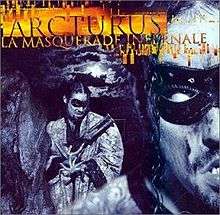La Masquerade Infernale
| La Masquerade Infernale | ||||
|---|---|---|---|---|
 | ||||
| Studio album by Arcturus | ||||
| Released | October 27, 1997 | |||
| Recorded | December 1996 - May 1997 at Jester Studio | |||
| Genre | Avant-garde metal, post-black metal, symphonic metal | |||
| Length | 45:12 | |||
| Label | Music for Nations | |||
| Producer | Kristoffer Rygg, Knut M. Valle | |||
| Arcturus chronology | ||||
| ||||
| Professional ratings | |
|---|---|
| Review scores | |
| Source | Rating |
| Allmusic | |
La Masquerade Infernale (French for The Infernal Masquerade) is the second studio album by Arcturus. Released by Misanthropy Records in 1997, the album marks a drastic musical change from the slow, nature-influenced symphonic black metal of Aspera Hiems Symfonia. The album has a dark, brooding sound, featuring heavy use of synthesizers and samples. Most of the songs revolve around the themes of theater, literature, and Satan. The screams characteristic of black metal utilized by Kristoffer Rygg on Aspera are replaced by a gruff, low-toned, clean vocal style. The album also features operatic singing and bizarre high-pitched singing from guest vocalist Simen Hestnæs, who nine years later would replace Rygg as the band's frontman. La Masquerade Infernale is regarded by many as Arcturus' masterpiece and one of the foremost examples of avant-garde metal. It was reissued by Candlelight Records in 2003.
The hybridization of electronic music, progressive metal and the avant-garde would have a profound influence on the writing and production of the Ulver album Themes from William Blake's The Marriage of Heaven and Hell, which was released the following year.
Track listing
| No. | Title | Length |
|---|---|---|
| 1. | "Master Of Disguise" | 6:42 |
| 2. | "Ad Astra" | 7:40 |
| 3. | "The Chaos Path" | 5:33 |
| 4. | "La Masquerade Infernale" (instrumental) | 2:00 |
| 5. | "Alone" | 4:39 |
| 6. | "The Throne Of Tragedy" | 6:33 |
| 7. | "Painting My Horror" | 5:59 |
| 8. | "Of Nails And Sinners" | 6:06 |
| Total length: | 45:12 | |
- The album is actually 1:27 longer than listed due to the hidden track at the beginning of "Master Of Disguise".
- The lyrics of "Alone" are taken from a poem by Edgar Allan Poe.
- "The Throne Of Tragedy" is divided into 66 parts. At the end of the track, the sub-track counter will have increased to 66, making the display show the number 666.
Personnel
|
|